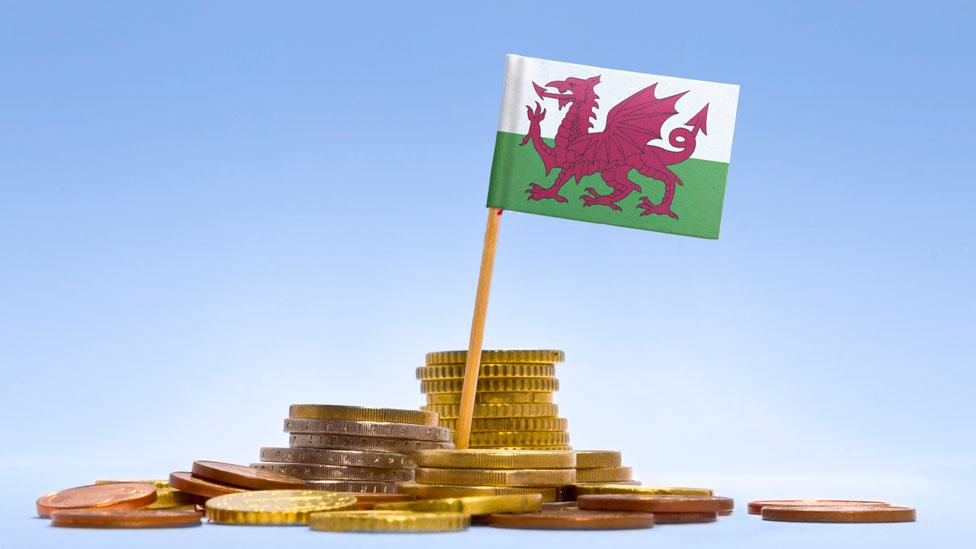Warning of 'double digit' Welsh council tax increases as funding announced
- Published

Councils fund schools, care services, waste collections and some local transport
Plaid Cymru says local authorities face "double digit" council tax increases after the Welsh government announced their funding for next year.
Council funding will rise by 7.9% on average, with Monmouthshire getting the largest increase and Blaenau Gwent the smallest.
The Welsh Labour government said it was prioritising frontline public services.
But council leaders said the increase only covers half of the gap of funding they face.
Plaid said the announcement falls "way short of what's needed", while the Conservatives called for councils to dig into reserve pots of cash.
One council leader warned services would have to be cut to avoid council tax rises of 10% and higher.
Wales' 22 local authorities operate schools, collect bins, run social care and libraries, among other services.
Councils do not get all their money from the Welsh government, with other sums coming from fees and council tax.
If council leaders cannot find ways of meeting their costs from their funding, they may look to raise council tax, or find ways of making savings by cutting services.
Before Wednesday's announcement Newport council is reported to have proposed a council tax rise of 9.5%, external, with cuts to bin collections and libraries.
It comes a day after the Welsh government announced its budget for the year, where ministers warned of a "perfect storm" facing the public services it supports.
The leader of the organisation that represents councils said the £5.5bn to local authorities from the Welsh government was more than had been expected, based on extra funding the UK government had given to Wales in the Autumn Statement.
But Andrew Morgan of the Welsh Local Government Association (WLGA) said: "The economic outlook remains bleak which means that councils will still have to take difficult decisions to meet spiralling budget gaps due to energy bills, inflation and pay costs."
The WLGA added that councils would look "at council tax levels, income generation and the way services are provided, as part of councils' statutory duty to set balanced budgets".
It said the announcement "covers just over half of the £784m budget gap in local government".
Llinos Medi, Plaid Cymru leader Anglesey council, warned that local services will have to be cut to avoid a double digit increase in council tax at her authority.
"If we didn't make any cuts to services, we'd look at 14% as an increase in council tax, and we couldn't do that."
She added: "I just feel like public services have been burnt, and we're down to the ashes now."
One authority - Rhondda Cynon Taf - is going to consultation on a 3.5% increase, alongside savings. Torfaen has committed to a 2% rise.
Monmouthshire will receive the largest rise in funding of 9.3%, rising to £122m, while Blaenau Gwent's funding will rise by 6.5% to £139m.
BBC Wales was told that the funding decisions are made according to a formula that "considers the relative demographic, physical, economic, and social characteristics of each area", and that Blaenau Gwent receives the most funding per person of all the local authorities.
Finance and Local Government Minister Rebecca Evans said: "This settlement builds on improved allocations in recent years and provides local authorities with a stable platform on which to plan their budgets for the coming financial year and beyond.
"When I announced our budget yesterday I prioritised the protection of frontline public services, and this increased funding to councils - who deliver so many of these services - is a vital part of that.'"


Rhiannon Ash says "no-one can afford" rising costs
Some people in Newport market told BBC Wales they saw how hard it was for councils right now - in the same way that they face increasing costs.
Rhiannon Ash, 36, said: "It's an issue that's affecting everything at the moment - the cost of everything is going up.
"So I can see why the councils would be feeling that pressure but obviously so are residents at the same time and nobody can really afford extra money for anything at the moment."
Amy Harrison, 32, said: "I think it's hard for councils as well but it just stings everyone else who's working and trying hard all the time."

What has the opposition said?
Sam Rowlands, council spokesman for the Welsh Conservatives, said: "I welcome the funding settlements for councils that bares a degree of reflection to the substantial usable reserves held by some councils.
"It is worth repeating these calls as the hundreds of millions of reserves could certainly be put to better use delivering frontline services to local people."
Plaid Cymru Senedd spokesman for finance and local government, Llyr Gruffydd, added: "This settlement is the price of the UK government's decision to impose austerity on Wales. It falls way short of what's needed to stave off big increases in council tax and further cuts to services. It is going to cost livelihoods and it is going to cost lives.
"Whilst any additional support is welcome, some parts of Wales will now be facing double digit council tax increases. It also means that after a decade of Westminster-driven cuts our key local services will have to contract further and even be lost altogether."


BAFTA CYMRU WINNERS: Celebrate the best television from Wales
WALES' HOME OF THE YEAR: Which home will Owain, Mandy and Glen judge worthy?

Related topics
- Published13 December 2022

- Published9 December 2022
